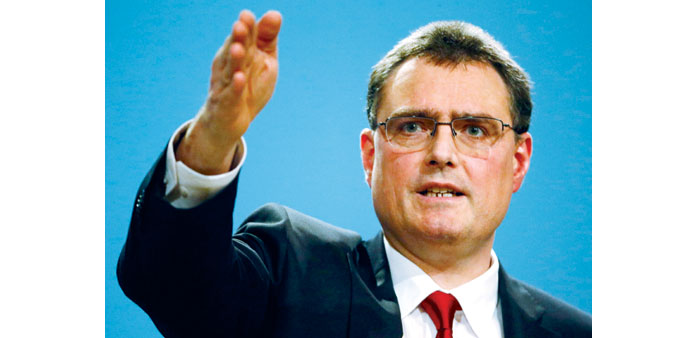Swiss National Bank (SNB) chairman Thomas Jordan gestures during a news conference in Bern yesterday. “I can tell you that we do not rule out another rate cut,” Jordan said.
Reuters
Berne
Switzerland’s central bank held off from tinkering with record-low interest rates after underwhelming easing from the European Central Bank last week gave it breathing space in the battle to weaken the Swiss franc.
Almost a year after the Swiss National Bank (SNB) sent markets into a tailspin by ending its franc cap against the euro, it held off from springing another surprise at its quarterly policy assessment yesterday.
As expected, it kept its target range for three-month Libor between -1.25 and -0.25% and a charge on some cash deposits at 0.75%.
The central bank also repeated its pledge to intervene in the currency market if necessary to weaken the “significantly overvalued” franc.
Switzerland’s export-reliant economy has avoided an anticipated recession in this year but stagnated in the third quarter due to the franc’s fall.
New SNB forecasts yesterday put growth this year at just under 1% and at about 1.5% in 2016 with inflation at -1.1% and price growth expected to return to positive territory in 2017.
SNB Chairman Thomas Jordan did dangle the prospect for more aggressive action if needed.
“I can tell you that we do not rule out another rate cut,” Jordan told a news conference.
With interest rates already at record low levels, some economists said the SNB was holding back some firepower in case it needs to react to further ECB easing in 2016.
The franc rose to a three-week high of 1.0795 per euro after the rate decision.
UBS economist Dominik Studer said the SNB was likely to keep rates steady barring a strong fluctuation in the exchange rate.
“As long as it can keep euro/franc in the 1.07-1.10 ‘comfort zone’ with limited interventions ... it is likely to refrain from more cuts,” he wrote in a note.
Credit Suisse economist Maxime Botteron said the rate decision was “a missed opportunity for the SNB to demonstrate its willingness to weaken the franc on a longer-term perspective”.
Last week’s ECB cut in the deposit rate had raised the prospect of a similar move by the SNB to maintain a larger spread in the two central banks’ interest rates.
The SNB has said this differential is an important factor in making the franc less attractive but must balance that by not inflicting too great a burden on savers and investors.
The SNB’s two-pillar approach of negative interest rates and currency purchases have helped the franc stabilise at around 1.08 per euro in recent months.
This is a tolerable level for exporters to the eurozone, Switzerland’s biggest trading partner, but some way off the 1.20 franc per euro ceiling that the SNB scrapped in January.
SNB efforts to weaken the franc could get a boost next week if the US Federal Reserve raises rates as widely expected.

